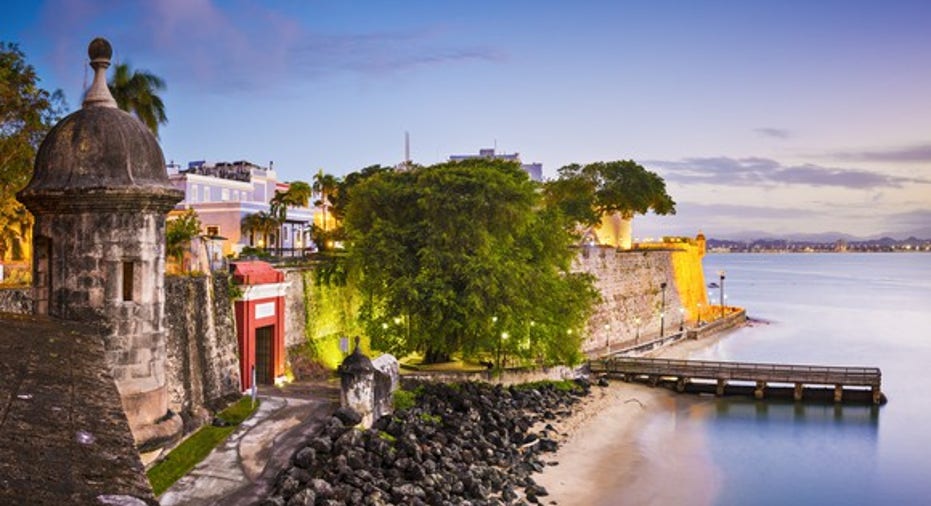Are General Obligation Bonds Really Safe? Puerto Rico Just Taught Us Otherwise

While there's no such thing as a risk-free investment, general obligation bonds were once thought to come pretty close. Unlike revenue bonds, which are municipal bonds backed by specific, defined revenue streams, general obligation bonds are backed by the full faith and credit of the issuing party. What this means is that municipalities that issue general obligation bonds are obligated to use all of their available resources and taxing power to make good on their payments to bondholders.
IMAGE SOURCE: GETTY IMAGES.
For that reason, defaults on general obligation bonds have historically been rare. No state has defaulted on a general obligation bond payment since 1933, and since the 1970s, there have been just five defaults on general obligation bonds -- that is, up until last week, when Puerto Rico defaulted on its general obligation debt, marking the first occasion since the Great Depression that a state or state-like entity has failed to make this type of payment.
A not-so-solid investment?
The news of the default wasn't exactly shocking. Puerto Rico's debt has been spiraling out of control for years. Since 2015, Governor Alejandro Garcia Padilla has proclaimed repeatedly that the island's bondholder obligations simply aren't payable. On July 1, Puerto Rico missed an estimated $911 million in bond payments, almost all of which was due to holders of the island's general obligation debt.
The issue at hand, however, is about much more than just a missed payment. It's about the fact that general obligation bonds may not be as sacrosanct as investors once thought. Not only did Puerto Rico fail to make its recent interest payment -- a payment that was supposed to trump all other disbursements, including those owed to police, teachers, and emergency personnel -- but as part of its current restructuring efforts, it's proposing to offer general obligation bondholders just 83.5% of what they're due.
Though the recent default was highly anticipated, and as such, hasn't rocked the municipal bond market too heavily, the whole situation calls the safety of general obligation bonds into question. While some might argue that Puerto Rico is in a unique situation (what with it being a commonwealth and therefore ineligible for Chapter 9 bankruptcy), the fact that its bondholders are facing significant losses means that future investors might rethink the value of buying general obligation bonds.
While municipal bonds offer certain advantages -- namely, the fact that they're exempt from federal taxes, and in some cases, states and local taxes, as well -- they've historically offered lower returns than corporate bonds. Thanks to Puerto Rico's recent shenanigans, investors may be less enthralled by lower-yielding securities that are supposedly backed by the full faith and credit of the issuing parties -- which, as we've just learned, doesn't always amount to much in practice.
Leaving bondholders out in the cold
Current holders of Puerto Rico's general obligation bonds are, at least for the moment, stuck without much recourse. On June 30, President Obama signed legislation calling for a federal oversight board to take control of Puerto Rico's finances, and oversee a restructuring of its $70 billion in debt. The board will be tasked with helping the commonwealth take control of its finances, and reduce its outstanding debt load.
It's unlikely that a restructuring will be finalized prior to year's end, which means that, for now, all bondholders can do is sit back and wait. Obama's legislation currently prohibits bondholders from filing lawsuits against the island -- a move previously employed by hedge funds in an attempt to minimize losses.
The question of recovery
It's too soon to tell how much of a haircut Puerto Rico's general obligation bondholders will wind up taking in the long run. Historically, the recovery rate -- the extent to which bondholders ultimately collect what they're owed -- for general obligation bonds has been close to 100%, but investors in Puerto Rico should by no means expect a full recovery.
Moving forward
The one thing we can all learn from Puerto Rico is that, even when it comes to general obligation bonds, there's no such thing as a guarantee. While some might argue that Puerto Rico is truly an extreme scenario, there's no telling when another municipality's full faith and credit will be called into question, and how much of a hit its general obligation bondholders will take in the process. Do your research on the feasibility of a municipality being able to repay its debts before buying.
The article Are General Obligation Bonds Really Safe? Puerto Rico Just Taught Us Otherwise originally appeared on Fool.com.
Try any of our Foolish newsletter services free for 30 days. We Fools may not all hold the same opinions, but we all believe that considering a diverse range of insights makes us better investors. The Motley Fool has a disclosure policy.
Copyright 1995 - 2016 The Motley Fool, LLC. All rights reserved. The Motley Fool has a disclosure policy.



















